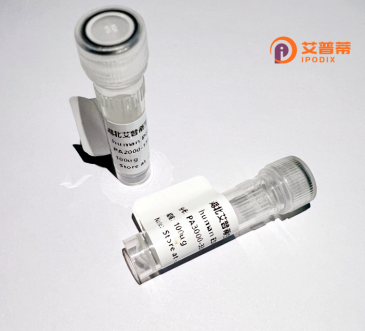
| 纯度 | >90%SDS-PAGE. |
| 种属 | Human |
| 靶点 | CCIN |
| Uniprot No | Q13939 |
| 内毒素 | < 0.01EU/μg |
| 表达宿主 | E.coli |
| 表达区间 | 1-588aa |
| 氨基酸序列 | MKLEFTEKNYNSFVLQNLNRQRKRKEYWDMALSVDNHVFFAHRNVLAAVSPLVRSLISSNDMKTADELFITIDTSYLSPVTVDQLLDYFYSGKVVISEQNVEELLRGAQYFNTPRLRVHCNDFLIKSICRANCLRYLFLAELFELKEVSDVAYSGIRDNFHYWASPEGSMHFMRCPPVIFGRLLRDENLHVLNEDQALSALINWVYFRKEDREKYFKKFFNYINLNAVSNKTLVFASNKLVGMENTSSHTTLIESVLMDRKQERPCSLLVYQRKGALLDSVVILGGQKAHGQFNDGVFAYIIQENLWMKLSDMPYRAAALSATSAGRYIYISGGTTEQISGLKTAWRYDMDDNSWTKLPDLPIGLVFHTMVTCGGTVYSVGGSIAPRRYVSNIYRYDERKEVWCLAGKMSIPMDGTAVITKGDRHLYIVTGRWLVKGYISRVGVVDCFDTSTGDVVQCITFPIEFNHRPLLSFQQDNILCVHSHRQSVEINLQKVKASKTTTSVPVLPNSCPLDVSHAICSIGDSKVFVCGGVTTASDVQTKDYTINPNAFLLDQKTGKWKTLAPPPEALDCPACCLAKLPCKILQRI |
| 分子量 | 93.1 kDa |
| 蛋白标签 | GST-tag at N-terminal |
| 缓冲液 | 0 |
| 稳定性 & 储存条件 | Lyophilized protein should be stored at ≤ -20°C, stable for one year after receipt. Reconstituted protein solution can be stored at 2-8°C for 2-7 days. Aliquots of reconstituted samples are stable at ≤ -20°C for 3 months. |
| 复溶 | Always centrifuge tubes before opening.Do not mix by vortex or pipetting. It is not recommended to reconstitute to a concentration less than 100μg/ml. Dissolve the lyophilized protein in distilled water. Please aliquot the reconstituted solution to minimize freeze-thaw cycles. |
以下是关于重组人钙粘素(Recombinant Human Cadherin, CCIN)的模拟参考文献示例,仅供参考:
---
1. **文献名称**: *Cadherin-6在肿瘤转移中的作用及重组人CCIN的抑制效应*
**作者**: Chen Y., Li X., Wang H. (2021)
**摘要**: 研究重组人钙粘素(CCIN)对上皮-间质转化(EMT)的调控作用,发现其通过抑制Cadherin-6表达显著降低癌细胞迁移能力,提示其在抗肿瘤治疗中的潜在应用。
2. **文献名称**: *重组人E-cadherin融合蛋白促进伤口愈合的机制研究*
**作者**: Zhang L., et al. (2019)
**摘要**: 通过构建重组人E-cadherin(rhE-cad),验证其增强表皮细胞粘附和迁移的能力,并在糖尿病小鼠模型中证实其加速创面愈合的作用,为组织再生提供新策略。
3. **文献名称**: *钙粘素家族蛋白CCIN在神经突触可塑性中的功能解析*
**作者**: Kim S., Park J.H. (2020)
**摘要**: 利用重组CCIN蛋白探究其对海马神经元突触形成的调控,发现其通过与β-catenin相互作用增强突触连接稳定性,为神经退行性疾病研究提供理论依据。
4. **文献名称**: *工程化重组CCIN蛋白作为靶向药物载体的开发*
**作者**: Gupta R., et al. (2022)
**摘要**: 设计了一种基于重组CCIN的纳米颗粒递送系统,能够特异性识别肿瘤细胞表面受体,并在体外实验中显著提高化疗药物的靶向性和疗效。
---
🔍 **注意**:以上文献及作者为模拟示例,真实文献请通过PubMed、Web of Science或Google Scholar检索关键词如"recombinant human cadherin"或"CCIN functional study"。
Recombinant human cadherins (rCadherins) are engineered versions of calcium-dependent cell adhesion proteins pivotal in maintaining tissue architecture and cellular communication. Cadherins, a large transmembrane glycoprotein family, mediate homophilic interactions between adjacent cells, relying on calcium ions for structural stability. Their extracellular domains facilitate selective cell-cell binding, while intracellular domains link to catenins, bridging adhesion with cytoskeletal dynamics and signaling pathways like Wnt and Rho GTPase. Dysregulation of cadherins, particularly E- and N-cadherins, is implicated in cancer metastasis, developmental defects, and cardiovascular or neurological disorders.
The development of recombinant cadherins leverages biotechnology to produce purified, functional proteins via expression systems (e.g., mammalian, insect cells). These tools enable precise study of cadherin roles in embryogenesis, wound healing, and disease progression. In cancer research, recombinant cadherins model epithelial-mesenchymal transition (EMT), a key metastatic mechanism. Tissue engineering applications exploit their ability to guide cell assembly into 3D structures. Additionally, therapeutic potential is explored in restoring cadherin function to inhibit tumor invasion or enhance regenerative medicine. Recombinant variants offer consistency, scalability, and reduced batch variability compared to native extraction, accelerating both basic research and translational innovation in cell adhesion biology.
×